In a series of meetings with Commerce and Industry Minister Piyush Goyal, exporters of textiles, steel, engineering goods, and agricultural products also sought immediate rollout of an Export Promotion Mission, market support for goods meant for the US, as well as an interest equalisation scheme for pre- and post-shipment export credit.
“Exporters spoke about the adverse effects of tariffs. They want support,” said an official.
Washington has imposed an across-the-board 25% tariff on all Indian-origin goods, effective August 7, along with a penalty. India’s competitors, including Pakistan, Vietnam, Bangladesh, and Turkey, are in the 15–20% range. The steep duty could hurt nearly half of India’s exports of more than $85 billion to the US, officials said.
“The problem with 25% duty is that our competitors are slapped with lower tariffs and hence, have a tariff advantage,” said a textile industry representative.

Exporters said if the tariffs were 20%, the burden could have been shared by the importer, exporter, and consumer, but the 25% duty demands fiscal support such as higher incentive under the Rebate of States and Central Taxes and Levies scheme. The textile industry has also flagged concerns over likely layoffs in the sector, as the US accounts for a third of India’s total textile exports and the high tariff could cause a loss of business. “The US market is price sensitive with lower design elements. The impact will be visible on core sport items like T-shirts and home textiles from September when the peak season for textiles starts,” the textile industry representative said.
The US was India’s largest export destination in fiscal 2025 with shipments valued at $87 billion, accounting for about a fifth of the $437 billion total.
Collaborative road map
“Had an insightful interaction today in Mumbai with leading industry captains from India’s vibrant textiles sector. Discussed bold ideas to enhance global competitiveness, sustainability, innovation & value chain integration. Together, we’re weaving India’s rise as a global textiles powerhouse,” Goyal wrote in a post on X.
In another post, he said: “Held a productive dialogue with major steel producers in Mumbai. Focused on ideas like advanced tech adoption, reducing logistics costs, increasing iron ore production, and expanding India’s role in global value chains by making our MSMEs more competitive. Looking forward to a collaborative road map ahead to forge a resilient & future-ready steel industry.”
Due to a lack of clarity of penalty, orders are restricted and there is a need for incentives, said another industry representative who participated in the meeting. “Also, the Russian import-linked penalty is not quantified or specified, and buyers are reluctant to place orders now. They don’t know the landed price and duty.”

